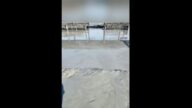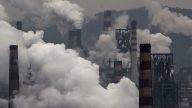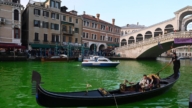【新唐人2013年08月21日訊】最近,在中國上海舉行的《2013長江上游聯合科考報告》發佈會上,科研人員發出了最嚴重的警告。報告顯示,長江流域密集的水電開發等工程,對生態環境和生物物種造成了滅絕性的影響,已經導致長江生態系統崩潰。對此,專家表示,當局大興水電造成的嚴重環境污染,同樣危及到了人類生存。分析指出,中共為片面追求經濟效益,破壞生態環境的做法,勢必要付出慘重代價。
大陸媒體《新聞晚報》8月15號報導,在《2013長江上游聯合科考報告》發佈會上,中共農業部「長江流域漁業資源管理委員會辦公室」官員趙依民表示,長江生態系統不堪密集的水電開發、採礦、開挖航道等活動,目前已經處於崩潰狀態。
對此,北京環保自願者、民間水專家張俊峰表示,像長江、黃河這樣的大型河流,在整個生態系統中起著至關重要的作用。一方面,它們在全球氣候變化系統中起到能量輸送和能量平衡的作用﹔另一方面,在河水流動過程中,對流域之內的生態系統也起著支撐作用。
民間水專家張俊峰:「如果對河流一旦採取了截流或者興水電等等措施的話,就相當於把河流本身所攜帶能量,提取出來用於人類生產生活,勢必就會使能量平衡的關係被打破,進而會引發整體氣候系統、生態系統等等這樣一種破壞,這種破壞應該隨著我們對河流利用的程度多少而展現出它的影響力。」
趙依民還強調,長江上游的金沙江幹流魚類資源也已瀕臨崩潰,原有的143種魚類,如今只剩下了17種。此外,據中科院水生物所等科研機構檢測,長江中的鱅、鰱、青、草「四大家魚」也急劇減少,由上世紀50年代的300多億尾,降到了目前的不到1億尾。
張俊峰:「由於建水庫、建大壩的過程之中,使得水體原來的基本狀況發生了極大的變化,水裡攜帶的不同種類的有機物或者無機物,甚至泥沙,由於大壩的阻攔作用,就改變了水體中所含物質的種類和量,整個的生態環境發生極大變化,那麼原來在水體中生存的這種水生物勢必都會跟著發生變化。」
大力興修水利電力設施,不僅給水生生物帶來了滅絕性的直接影響,也對水環境造成了嚴重污染。長江沿岸的居民一直深受其害,對此怨聲載道。
江蘇宜興市的環保活動人士吳立紅:「太湖現在,像稀飯一樣、漿糊一樣,已經臭掉了,像大便一樣臭的不得了。」
家住在長江下游太湖附近的環保活動人士吳立紅告訴《新唐人》,無論污染有多麼嚴重,當局都是採取一種漠視的態度,「中國(共)環境保護部」從來沒有起到過應有的作用。
吳立紅:「反映了20來年沒用,為甚麼?現在中國應該說《環保法》很厲害的,輕者要判坐牢,重者要槍斃的,但是下面這些官員還是把上面的法律架空的,存在一個官商勾結的腐敗現象,欺上瞞下,上面一些部門也在默認他們,中國的環保部有推卸不了的責任。」
另外一方面,專家認為,大規模的水庫和水電站建設也是造成目前大陸自然災害不斷的原因之一。
吳立紅:「從整體系統來說,會加劇氣候系統的變化,也就是我們所看到的,極端的氣候現象層出不窮,勢必對整個流域內的生產、生活會造成我們所看到這種洪澇、乾旱這樣一種狀態,會越來越多的出現。」
四川省地礦局地質調查隊總工程師范曉早在2009年就已經警告當局,不要為了片面追求水能發電的經濟效益,以犧牲百姓利益、生態環境、地質環境、自然文化遺產為代價,採用竭澤而漁、斬盡殺絕非持續發展的模式搞水電開發。他指出,這樣會給生態環境和社會環境帶來巨大損害和長期隱患。
從越來越多的現象顯示,當局依然一意孤行,造成了如今不可挽回的損失。
採訪/陳漢 編輯/張天宇 後製/李勇
Environmental Survey: Yangtze River Ecosystem Collapsing
A press release of a 2013 survey on upstream ecosystems
in the Yangtze River was recently held in Shanghai.
The researchers sent a most serious warning.
The report shows intensive hydropower
projects in the Yangtze River delta have
made local biological species go extinct.
This has led to the collapse of the
Yangtze River’s ecological environment.
Experts say that vigorous promotion of hydroelectric
construction by the Chinese Communist Party (CCP),
has caused serious pollution, endangered people.
Analysts warn that the CCP has sacrificed the environment
for excessive economic pursuits, and will pay a heavy price.
A launch event of the 2013 joint scientific research report
on the upstream Yangtze River was held on August 15.
Zhao Yimin, an official from the Agriculture Ministry,
said the Yangtze River’s ecosystem is now in collapse.
This is the result of local intensive construction, including
hydropower projects, mining, and waterway excavations.
Hydrological expert Zhang Junfeng, comments.
Large rivers such as Yangtze River and the Yellow
River play crucial roles within the entire ecosystem.
They can transfer and balance energy
coming in and out for the global climate.
Also, river flow supports the ecosystems
within the scope of the river basins.
Zhang Junfeng: “Damming up a river, building
hydroelectric stations, or similar initiatives
can upset the balance of the rivers energy.
This will trigger further destruction of the
overall climate and ecological system.
Its destructive influence depends
on human exploitation of the rivers.”
Zhao Yimin adds that fish species in the Jinsha River,
a tributary of the Yangtze River, are now near extinction.
The river now only has 17 fish species,
compared with the original 143 species.
The official research institutions reports show a sharp
drop of four major fish species in the Yangtze River.
The amount of fish is down to less than
100 Million, from over 30 Billion in the 1950s.
Zhang Junfeng: “Construction of reservoirs and dams
have greatly changed the original water situation.
Damming up the water has changed the type
and quantity of organic or inorganic matter
carried in the water, which includes sands.
This has led to a huge ecological change, directly
affecting species that originally lived in these waters.
The CCP authorities’ vigorous push in hydroelectric
construction has fatally affected local aquatic organisms.
It has also given rise to serious pollution of local waters.
Residents living along the Yangtze River have been
affected, and have been complaining for many years.
Wu Lihong, environmental activist, Yixing, Jiangsu Province:
“Lake Tai now looks like porridge.
It emits a terrible odor, like feces.”
Ms. Wu lives near the Lake Tai,
downstream of the Yangtze River.
She tells NTD that the CCP authorities have always
disregarded the pollution, no matter how serious it is.
The CCP-led Ministry of Environmental Protection
has never performed its duties, she says.
Wu Lihong: “It’s useless, even after our 20 year
efforts, to let them know about the problem. Why?
China’s current Environmental Protection Law has
severe penalties, from jail terms to the death penalty.
But local officials have made the law a mere figurehead.
It is common for officials to collude with businessmen,
with some superior authorities standing by without acting.
The Environmental Protection Ministry
cannot escape these responsibilities.”
Experts believe that large reservoirs and
hydropower construction have contributed
to currently frequent disasters in China.
Wu Lihong: “These constructions
have deteriorated the overall climate.
This is what we’ve seen, incessant
occurrence of extreme weather events.
Also, floods and droughts become inevitable
results, and we can expect more in the future.”
In 2009, Fan Xiao, the Chief Engineer at the Geology and
Mineral Administration in Sichuan Province, sent a warning.
He warned the CCP to not pursue the economic
benefits of hydroelectric power at the expense of
the ecological environment, and cultural heritage.
He said that hydroelectric power development
is like draining the pond to catch all the fish.
It is non-sustainable.
It will cause tremendous damage and hidden
dangers to China’s ecological and social environment.
Currently, more facts indicate that the CCP
authorities still continue on track with their plans.
This road has created irreparable damage for China.


























